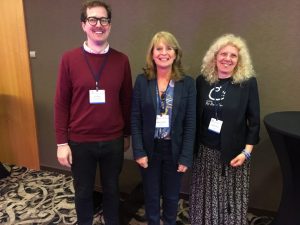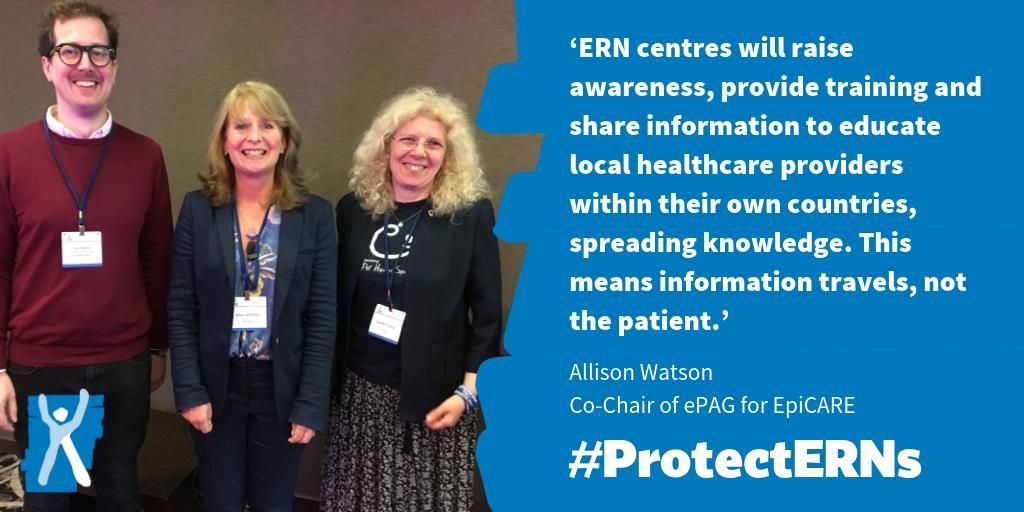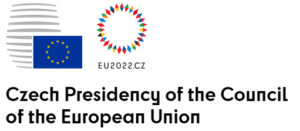Allison Watson, Co-Founder of Ring20 Research and Support UK CIO and Co-Chair of EpiCARE’s patient advisory group (ePAG) wrote on the benefits of European Reference Networks (ERNs) provide for rare disease patients across Europe. Her article was published on the Genetic Alliance UK’s blog. Genetic Alliance UK is national charity working to improve the lives of all those affected by genetic conditions that runs the #ProtectERNs campaign.
Allison Watson, Co-Founder of Ring20 Research and Support UK CIO and Co-Chair of ePAG for EpiCARE
There are currently 13 patient advocates within the Rare and Complex Epilepsies (EpiCARE) European Patient Advisory Group (EPAG), representing many different patient organisations across the UK, Italy, Spain, France, Finland, Czech Republic, Netherlands, Belgium and Germany.
For some with the rarest of diseases, the support from a patient group to connect with other families does not even exist. European Reference Networks (ERN)’s were born out of a need to address the gap in patient care for rare diseases where the focus and funding has historically been in the more common diseases, but equally we do not want the rarest of diseases left behind.

The #EUProtects campaign is a great example of how doctors from the UK collaborated with colleagues across the EpiCARE reference network in France and Sweden to help 4 year-old Onni from Finland to receive the surgery he needed to treat his rare epilepsy. You can watch the video here.
ERNs can offer a lifeline for these patients and the healthcare professionals who treat them. Making the connections where it is otherwise impossible, sharing knowledge and helping the undiagnosed find a diagnosis. Recognising these patients enables better understanding of the needs of all with rare disease, not just the more ‘common’ rare diseases and brings a level of equity for improved outcomes for all. Effectively, ERNs are collaborating to ‘leave no-one behind’.
Why is there a need for an ERN for epilepsy? Isn’t this the most common neurological condition?
Epilepsy is not a disease; it is a term to describe the symptoms experienced by those affected by seizures – of which there are over 40 different types. The causes of epilepsy can be many, including genetic or metabolic disorders, head injuries and illness. Around two thirds of patients have their seizures controlled effectively by medication or other treatment and many children may grow out of their epilepsy. However, for the remaining third the seizures do not respond to medication, patients are susceptible to a multitude of side effects from ineffective medication, and importantly many experience additional problems (comorbidities) such as cognitive decline, behaviour issues and loss of function such as the ability to walk, talk or feed. These individuals may have a specific underlying root cause for their condition – one of 130+ rare diseases known as ‘the epilepsies’.
So, if ‘the epilepsies’ are rare diseases, why do we need an ERN?
Just like the 6,000+ other rare diseases, knowledge and information on how to diagnose, treat and care for patients with ‘the epilepsies’ is lacking, and patient outcomes are often poor. Uncontrolled seizures adversely impact quality of life and at worst can be life-limiting. There is a need to improve awareness and education across Europe and the world about ‘the epilepsies’. Patients affected by a rare disease may find they are the only patient that their healthcare professional will ever treat in their lifetime and even the most ‘expert’ centres within their own country may have limited, if any, experience in the disease. This is where ERNs can provide a huge benefit, enabling a consultant to virtually connect with experts from within the EpiCARE network where the answers to questions may be found and outcomes may be improved. The aim is for treatment on a trial and error basis to eventually be eradicated. ERN centres will raise awareness, provide training and share information to educate local healthcare providers within their own countries, spreading knowledge. This means information travels, not the patient.
Within EpiCARE there are 16 Work Packages (WP) delineated by areas of discovery, rather than focusing on each rare disease separately (as in many other ERNs). WPs target areas such as improving diagnostics, creating a central patient registry, seeking targeted medical therapies, updating/creating clinical guidelines, as well as improvements to testing techniques. Cutting across all of these are WPs covering education and training, research and clinical trials and dissemination.
The UK has doctors, researchers and scientists with some of the most expertise in Europe, if not the world – but with 6,000+ rare diseases and counting, being an expert in every rare disease is impossible. If you or a loved one are affected by a rare disease you will want the best treatment, the best care and the best outcome – right? But what if that cannot be found within the UK? What if the expertise lies elsewhere in Europe? Equally our fellow Europeans should not be denied access to expertise within the UK. If we all campaign to #ProtectERNs, access to what you need may remain within you and your healthcare professional’s grasp, ensuring ‘borders without boundaries’. Whatever the outcome of Brexit, the human right to optimum healthcare should be protected.
Join us and sign up to #ProtectERNs today!
About Allison Watson
Allison Watson holds a voluntary position as Co-Chair of the European Patient Advocacy Group (ePAG) in the European Reference Network (ERN) for Rare and Complex Epilepsies (EpiCARE). Allison is the Co-Founder of Ring20 Research and Support UK CIO a patient support group based in the UK supporting patients, families and healthcare professionals across the globe who are affected by, or come into contact with, Ring Chromosome 20 Syndrome – or r(20) syndrome for short – an ultra-rare epilepsy syndrome with only 150 cases cited worldwide. Allison advocates for the ultra-rare diseases where basic resources such as clinical practice guidelines, patient registries, effective treatments, research and clinical trials, and prognosis are scarce – if not completely absent.
The original article can be found on the Genetic Alliance UK’s website.




